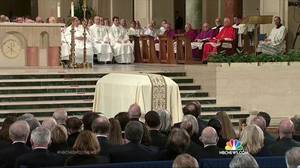
 REALIZE THAT I AM LATE in posting on Justice Antonin Scalia’s funeral, but I would like to share two observations. The first observation is a very simple one. If every Catholic funeral in the Ordinary Form were to show forth even a quarter of the noble beauty of Scalia’s funeral (thanks to Dr. Latona for such wonderful music), or even if they were simply oriented toward our Heavenly Father as Scalia’s was—instead of focusing primarily on us “humankind”—the Faith in the United States would look very different. Having said that, I come to the second and actual reason for my post, the issue of the choir and cantor.
REALIZE THAT I AM LATE in posting on Justice Antonin Scalia’s funeral, but I would like to share two observations. The first observation is a very simple one. If every Catholic funeral in the Ordinary Form were to show forth even a quarter of the noble beauty of Scalia’s funeral (thanks to Dr. Latona for such wonderful music), or even if they were simply oriented toward our Heavenly Father as Scalia’s was—instead of focusing primarily on us “humankind”—the Faith in the United States would look very different. Having said that, I come to the second and actual reason for my post, the issue of the choir and cantor.
The role of both choir and cantor is to lead the congregation in singing. Okay, I understand that—but what I don’t understand is why some feel the need to have both leading the singing at the same time. The cantor often leads the congregation by himself, so why can’t the choir do the same. I have an assistant who helps me direct the choir. We often both direct the choir, but NEVER at the same time. Even if he and I were to direct exactly the same way (which would never happen), one of us would be superfluous. The same thing happens when the choir and cantor lead together, only in the end, the cantor will win over the choir because he/she is one large voice with a microphone. Not only that, but the cantor will win over the congregation.
As I watched Scalia’s funeral, I loved listening to the Entrance Hymn, O God, Our Help in Ages Past. The choir and congregation sang it equally well, but there was always one big voice that I could never fully block out, that of the cantor. It was like listening to the most beautiful choir in the world, minus the one singer who decided to sing louder than everyone else in order to lead. I have been told before by “experts” that the reason to have a cantor lead even when the choir is singing is so the congregation will watch the cantor’s arms and know when to come in. Excuse me, but if we think that little of the mental capacities of our congregations, martyr me now, because there is no hope for the New Evangelization. Please, let the choir lead!

